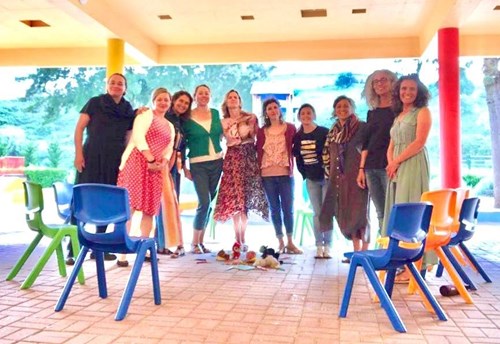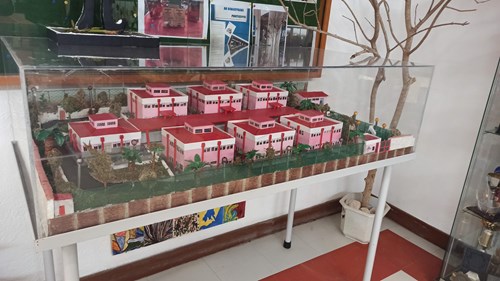A trip to Portugal as part of Erasmus+ international mobility appeared to be the most feasible option for a field visit. In May 2022, we took advantage of the opportunity to spend a week in Lisbon and shadow the workers of the non-governmental organization Florescer - Associação de Educação Global. During our stay, we observed the daily school routine of children who live in socially excluded areas, in difficult family conditions and children from ethnic minorities. We have witnessed the introduction of a unique educational innovation that strengthens the entire school community through continuous support. Our main guide and tutor was one of the founders of the organization, Maria Teresa Mendes, who during our stay informed us about the details of introducing council into schools.
Since the 2018/2019 school year, the association has been implementing the Aprender em Circulo (Learning in Circle) project in the municipality of Oeiras in the Lisbon metropolitan area. At Escola EB2,3S Aquilino Ribeiro, which we visited, Florescer is working on a systemic transformation of school activities with participatory strategies and learning in the circle, in and out of the classroom. It supports a team of teachers and children in the development of autonomous and project-based learning, through pedagogical roadmaps and games, workshops focused on emotions, rhythmic exercises in a circle (here it is based on Waldorf pedagogy), advisory circles and student decision-making through sociocracy. The project team develops accredited and contextual education for teachers, teacher assistants (who assist classes and supervise breaks), training young leaders for peace (focused on mastering the process of conflict mediation), tutoring and coaching teachers (individual and group). The project is based on studies that demonstrate the social-emotional and academic benefits of circular work: fewer cases of expulsion or suspension, fewer disciplinary measures, interpersonal conflicts and cases of bullying, better academic results, a safer, happier and more inclusive school environment, more commitment and student satisfaction at school, greater fairness in the application of school discipline, strengthening of development assets (Enhanced Development Assets Ⓡ, Search Institute).
On the first day of our visit, we start at the second grade of the elementary school, which shares the campus with the vocational school. The first thing that caught our attention upon entering is the architecture of the school itself. The common yard with a covered central part, where pupils spend their breaks protected from the rain and strong sun, is surrounded by seven separate two-storey buildings. There are only a few classrooms in each, one has a choir room, another has a library or a canteen, where teachers go for coffee and students for a snack. Compared to the huge buildings of our big schools, where the classes are next to each other, the common spaces seem much calmer and cozier. We walk across the yard to the classroom, where a group of sixth graders will work together with one of the tribal teachers and the pedagogues from Florescer. We sit in a circle, the students share how everyone is doing, we are asked questions as those visiting from abroad, what is our favorite food and how long have we been traveling. Pupils are given a task for the morning - activities from mathematics and Portuguese, they decide when they want to work on them. They also have table games and other activation options. We soon understand that the circle practice is well known to the children and they have no problem joining in, but no one is obliged to share, the introduction of time spent together is based on voluntariness. When asked what they say about sharing in a circle, the students answer with the words "We make a circle when we want to resolve a conflict... I like to play games... I like the circle because it helps us talk together and be calm".
The next day we have the opportunity to see how the school day starts with circle activities in the first grade (Escola EB1/JI Pedro Álvares Cabral). We are heading to another school building on the edge of the housing estate, which is adjacent to the kindergarten. The educators from Florescer meet in front of the school and after a short conversation, each of them heads to one of the teachers and his class. The children start the day outside in a circle of activities - a mindfullness moment focused on their own breath and the sensations that our senses convey to us, with joint rhythmic games that develop not only a sense of belonging but also coordination, right-left orientation and motor skills, sharing how they are, a song or a short relaxation accompanied by music. The little ones are placing palms in front of their face before answering the question "How am I doing today?" so that they can see the answer "in the mirror" and then pass the word to the neighbor on the left by clapping hands. As part of the project, students will also complete other activities focused on the development of emotional intelligence, cooperation and autonomy, and conflict mediation. Together with the second graders, we wrote the initial of our first name and looked for what characteristics we have starting with the same letter. The older children, together with the class teacher, planned "Navigators' Day" using sociocracy procedures, agreed that they would like to play a treasure hunt and thought about what types of tasks could be in the game.
After an interview with the director of the school, Isabel Marques, we delve into the essence of cooperation with the Florescer organization. The visited schools are part of the school cluster "Agrupamento de Escolas Aquilino Ribeiro", which includes several smaller kindergartens and elementary schools as well as secondary schools up to the 12th grade (professional training starts in Portugal from the 9th grade). In total, the Agrupamento de Escolas Aquilino Ribeiro has about 1500 pupils, about 150 teachers and 50 assistants. The school is located in the TEIP area (i.e. educational area with priority intervention) in the excluded neighbourhoodof Bairro dos Navegadores. Many children who attend school live in unstimulating family environments, have behavioral problems, cognitive difficulties, lower intellectual development, all of which prevent them from succeeding in school. The school is then a place where adults pay attention to children, a place where the mission of education is fulfilled, which, according to the headmistress, is to help pupils think critically, analyze and be good citizens. The program implemented by the staff of Florescer, a non-profit organization, was initiated by the municipality of Oeiras and designed primarily for the needs of this population. The vision of local government workers for education in the area is very good and schools receive support, which is positively assessed by all actors of the educational process. The director of the school complex states that the forms of education in Portugal are still very conservative and the teachers are used to replicating these old established ways. However, she sees the need to focus on how the students themselves learn, who need effective tools to learn and grow on their own. "In the conservative education system, we lose some children because they are not able to follow the mainstream, they need other ways to support their own talents," says the director. In this context, circular practice and other educational innovations that Florescer brings to the school are very meaningful. Pupils are able to fulfill their potential and the school environment has an inclusive character. However, we must not forget the teachers who often step out of their comfort zone in such an environment, changing their attitude takes a long time, some teachers are very resistant, but the school management observes that others are already including new elements in their teaching. "I hope that in a few years we will see a change that will convince even the more conservative colleagues. We expect a lot from the students who have been involved in the program since the first grade and will start the second grade after the holidays. They are very capable, they are used to working differently, they are independent. They have good grades and we hope that it is not just because of the grades themselves, but that it is because of their desire to learn," adds.
During our stay, we had the opportunity to witness the cooperation of the members of the Florescer association with the school's pedagogues at various times - during work with classes, an informal joint lunch, which they go to a restaurant once a week, and a circle practice workshop for pedagogues, which we participated in. The question arose whether the parents of the students and the local community are somehow involved in the project. Originally, Florescer intended to include these activities in the project, but it was asked to focus mainly on the support of pupils and teachers. As part of the project, teachers complete 25 hours of professional training, building their syllabus from the offered modules. In addition, some of them use the offer of individual coaching and mentoring. We see this support for educators as key - the project does not just want something from them, but also offers it - in this case, a change in the way they work and life itself by supporting and providing space for personal growth and emotional strengthning.
The study trip to Portugal fulfilled its purpose. We have verified that council as an innovation in education has its place at all levels of the education system. If support can also be found across the system, i.e. also from school founders, we have the opportunity to support the potential of each child at its maximum. Councils can be a fragment that complements the mosaic of complex intervention measures, which help to successfully implement the idea of inclusive education in practice.
English translation of Czech article, published in Komenský, 147/2, online






